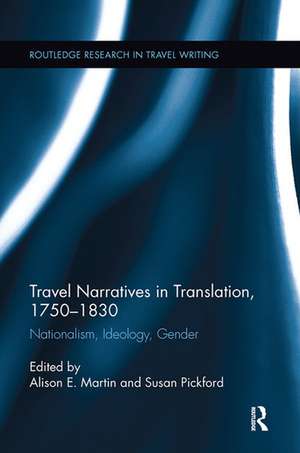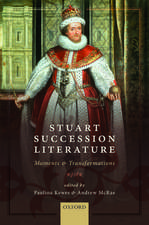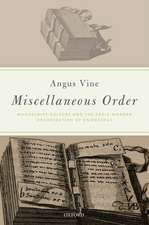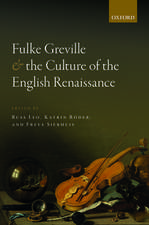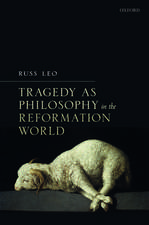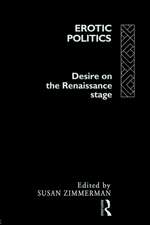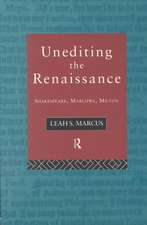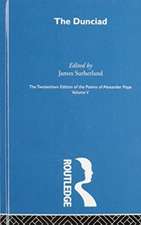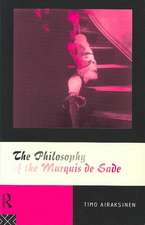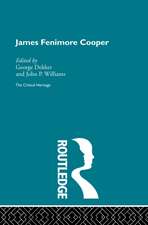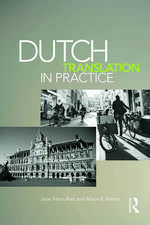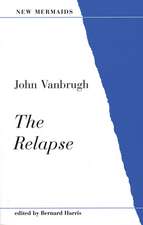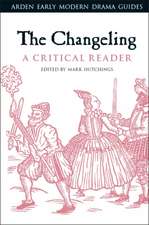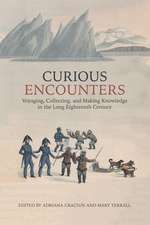Travel Narratives in Translation, 1750-1830: Nationalism, Ideology, Gender: Routledge Research in Travel Writing
Editat de Alison Martin, Susan Pickforden Limba Engleză Paperback – 31 mai 2017
| Toate formatele și edițiile | Preț | Express |
|---|---|---|
| Paperback (1) | 416.22 lei 6-8 săpt. | |
| Taylor & Francis – 31 mai 2017 | 416.22 lei 6-8 săpt. | |
| Hardback (1) | 1060.19 lei 6-8 săpt. | |
| Taylor & Francis – 26 iul 2012 | 1060.19 lei 6-8 săpt. |
Din seria Routledge Research in Travel Writing
-
 Preț: 378.12 lei
Preț: 378.12 lei -
 Preț: 438.48 lei
Preț: 438.48 lei - 14%
 Preț: 326.49 lei
Preț: 326.49 lei - 12%
 Preț: 317.18 lei
Preț: 317.18 lei -
 Preț: 302.01 lei
Preț: 302.01 lei -
 Preț: 382.36 lei
Preț: 382.36 lei -
 Preț: 384.09 lei
Preț: 384.09 lei -
 Preț: 383.33 lei
Preț: 383.33 lei -
 Preț: 381.00 lei
Preț: 381.00 lei - 12%
 Preț: 312.43 lei
Preț: 312.43 lei -
 Preț: 387.75 lei
Preț: 387.75 lei -
 Preț: 389.38 lei
Preț: 389.38 lei -
 Preț: 437.13 lei
Preț: 437.13 lei -
 Preț: 392.54 lei
Preț: 392.54 lei -
 Preț: 388.90 lei
Preț: 388.90 lei -
 Preț: 382.36 lei
Preț: 382.36 lei -
 Preț: 389.49 lei
Preț: 389.49 lei -
 Preț: 385.25 lei
Preț: 385.25 lei -
 Preț: 389.11 lei
Preț: 389.11 lei - 18%
 Preț: 1054.71 lei
Preț: 1054.71 lei - 18%
 Preț: 998.83 lei
Preț: 998.83 lei - 18%
 Preț: 1116.77 lei
Preț: 1116.77 lei -
 Preț: 389.29 lei
Preț: 389.29 lei - 18%
 Preț: 1111.40 lei
Preț: 1111.40 lei - 18%
 Preț: 1108.56 lei
Preț: 1108.56 lei - 18%
 Preț: 1052.22 lei
Preț: 1052.22 lei
Preț: 416.22 lei
Nou
Puncte Express: 624
Preț estimativ în valută:
79.64€ • 83.60$ • 66.11£
79.64€ • 83.60$ • 66.11£
Carte tipărită la comandă
Livrare economică 11-25 aprilie
Preluare comenzi: 021 569.72.76
Specificații
ISBN-13: 9781138116849
ISBN-10: 113811684X
Pagini: 244
Dimensiuni: 152 x 229 x 13 mm
Greutate: 0.45 kg
Ediția:1
Editura: Taylor & Francis
Colecția Routledge
Seria Routledge Research in Travel Writing
Locul publicării:Oxford, United Kingdom
ISBN-10: 113811684X
Pagini: 244
Dimensiuni: 152 x 229 x 13 mm
Greutate: 0.45 kg
Ediția:1
Editura: Taylor & Francis
Colecția Routledge
Seria Routledge Research in Travel Writing
Locul publicării:Oxford, United Kingdom
Public țintă
Postgraduate and UndergraduateCuprins
Introduction Alison E. Martin and Susan Pickford Part I: Translation, Identity, and Ideology 1. The Travels and Translations of Marc-Antoine Eidous, Encyclopedic Mediator of Enlightenment Texts Clorinda Donato 2. Autopsy, Translation, and Editing in the Production of Johann Jacob Volkmann’s Historisch-Kritische Nachrichten von Italien (1770-71) Jeff Morrison 3. Translating Helvetica: Travel Writing, Intertext and Image Anthony Ozturk 4. Translation, Rewriting, Adaptation: The Itinéraire descriptif de l'Espagne by Alexandre de Laborde Inmaculada Tamarit Valles Part II: Extra-European Travel Writing and Translation 5. Translating the Great Maritime Explorations: On John Reinhold Forster’s Translation of Bougainville’s Voyage autour du monde Vladimir Kapor 6. Translating the Pacific: Georg Forster’s A Voyage round the World/Reise um die Welt (1777-1780) Carl Niekerk 7. The Travel Writer as Translator: The Case of Friedrich Ludwig Langstedt (1750-1804) Chen Tzoref-Ashkenazi Part III: Women in Translation 8. Lady Mary Wortley Montagu’s Letters in France: Between Ideological Turn and Women’s Writing Rachele Raus 9. A Treasure-Hunt in Europe at War, or "a passage in the history of a heart"?: The Translation of Mary Wollstonecraft’s A Short Residence in Sweden into Portuguese Maria de Deus Duarte 10. Writing with "manly vigour": Translatorial Agency in Two Early-nineteenth-century English Translations of François Pouqueville’s Voyage en Morée, à Constantinople et en Albanie (1805) Susan Pickford Contributors Index
Recenzii
"A highly insightful collection, which by dint of its particular focus distinguishes itself clearly from other works on travel writing and starts to address an important lacuna in this field of research." --Gabriele Eichmanns, Carnegie Mellon University, German Studies Review
"A most welcome and major contribution to the study of (Enlightenment) travel writing… The authors make anyone interested in travel writing eminently aware of the need to study travel narratives in translation in order to receive a more complex and representative view of their function as vehicles of cultural mediation—and that is quite an achievement in academic terms." --Jan Borm, Université de Versailles—Saint-Quentin-en-Yvelines, Cercles
"Travel Narratives in Translation, 1750-1830: Nationalism, Ideology, Gender is a timely and important contribution to the continued growth of Translation Studies and catches the zeitgeist currently emerging in the field of Romantic-period studies concerning the significance of translation as the means of inter-cultural, literary and socio-political exchange." --Paul Hague, University of Wolverhampton, The BARS Review
"A most welcome and major contribution to the study of (Enlightenment) travel writing… The authors make anyone interested in travel writing eminently aware of the need to study travel narratives in translation in order to receive a more complex and representative view of their function as vehicles of cultural mediation—and that is quite an achievement in academic terms." --Jan Borm, Université de Versailles—Saint-Quentin-en-Yvelines, Cercles
"Travel Narratives in Translation, 1750-1830: Nationalism, Ideology, Gender is a timely and important contribution to the continued growth of Translation Studies and catches the zeitgeist currently emerging in the field of Romantic-period studies concerning the significance of translation as the means of inter-cultural, literary and socio-political exchange." --Paul Hague, University of Wolverhampton, The BARS Review
Descriere
This book examines how non-fictional travel accounts were rewritten, reshaped, and reoriented in translation between 1750 and 1850, a period that saw a sudden surge in the genre's popularity. It explores how these translations played a vital role in the transmission and circulation of knowledge about foreign peoples, lands, and customs in the Enlightenment and Romantic periods. The collection makes an important contribution to travel writing studies by looking beyond metaphors of mobility and cultural transfer to focus specifically on what happens to travelogues in translation. Chapters range from discussing essential differences between the original and translated text to relations between authors and translators, from intra-European narratives of Grand Tour travel to scientific voyages round the world, and from established male travellers and translators to their historically less visible female counterparts. Drawing on European travel writing in English, French, German, Spanish, and Portuguese, the book charts how travelogues were selected for translation; how they were reworked to acquire new aesthetic, political, or gendered identities; and how they sometimes acquired a radically different character and content to meet the needs and expectations of an emergent international readership. The contributors address aesthetic, political, and gendered aspects of travel writing in translation, drawing productively on other disciplines and research areas that encompass aesthetics, the history of science, literary geography, and the history of the book.
